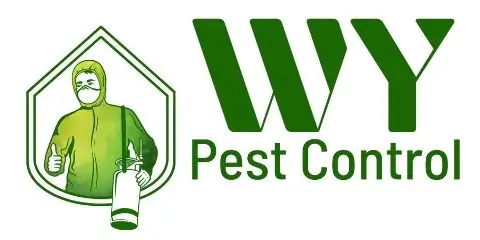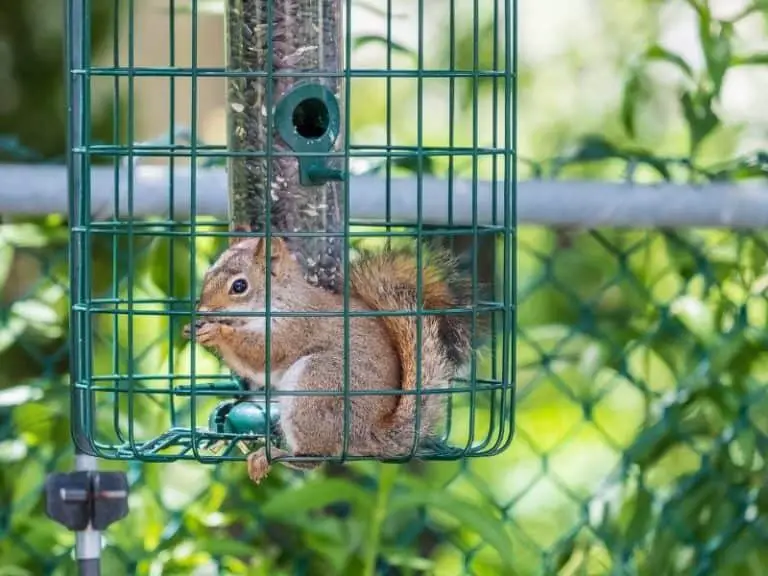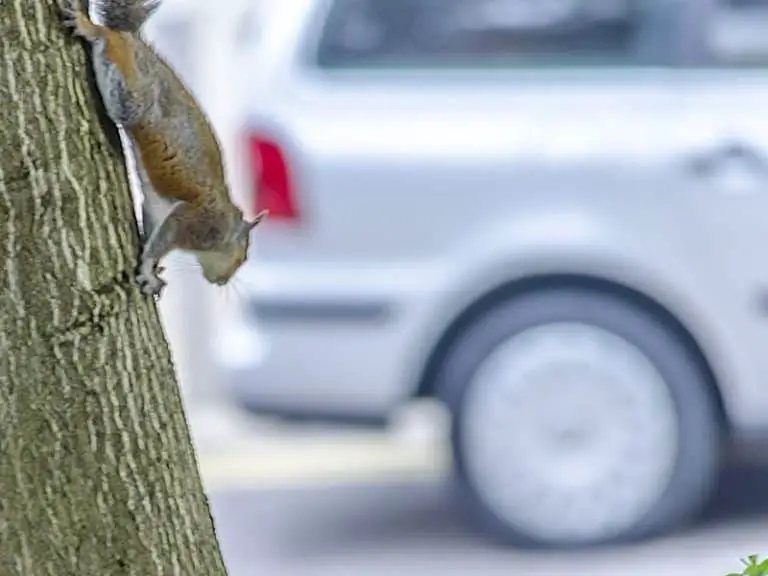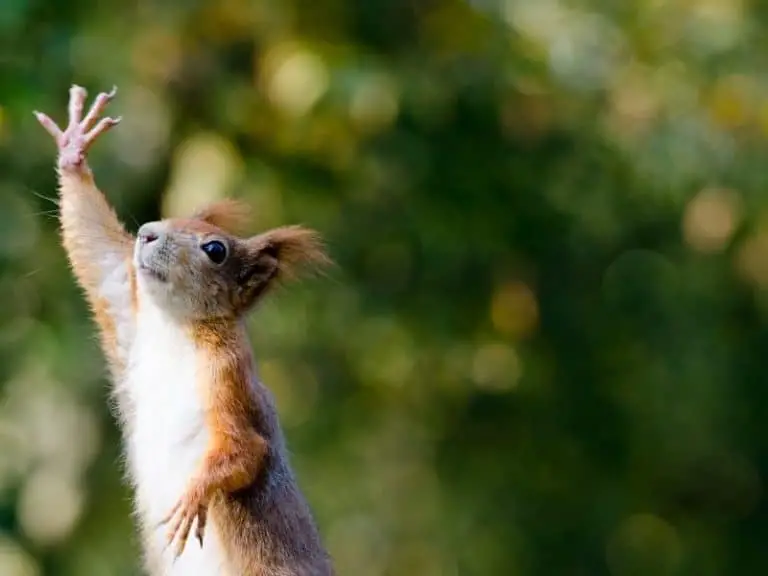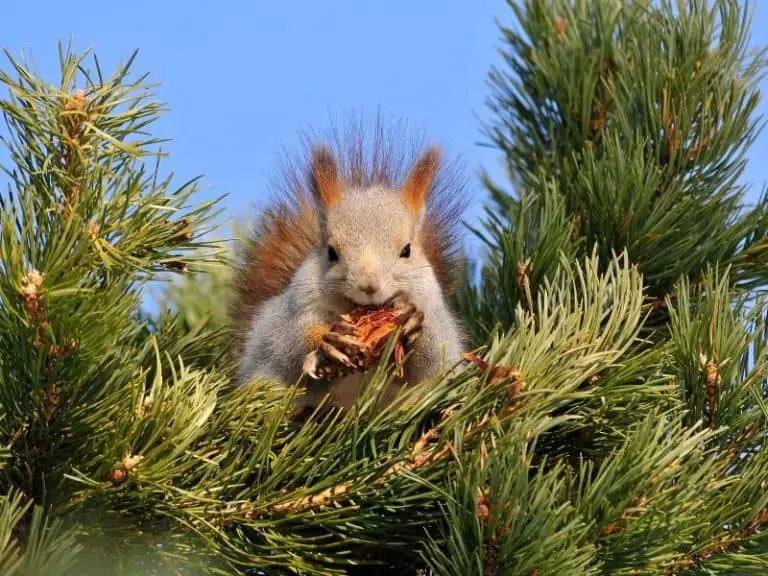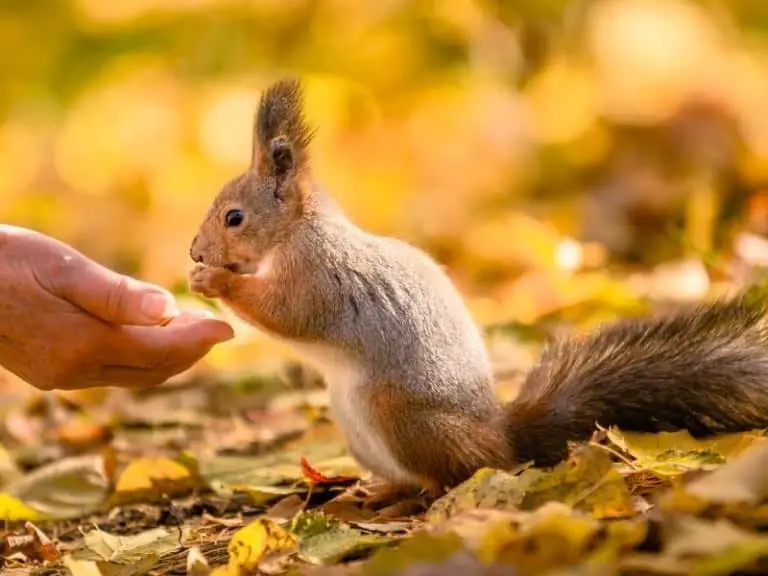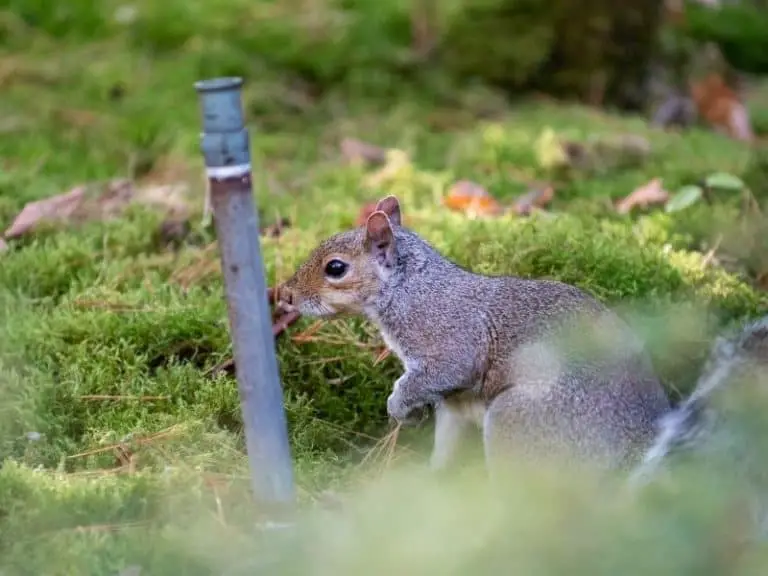What Do Squirrels Drink? You May Be Surprised
Feeding squirrels is a wonderful way to make them healthy and satiated, as well as feel welcome on your property. Besides food, it’s also a fantastic idea to offer them something to drink. It will keep them hydrated, especially during the hottest months of the year.
Squirrels drink just about any liquid available. Some are good for them, such as water, 100% pure fruit and vegetable juices, milk replacer and herbal tea. However, some are bad for squirrels, such as coffee, true tea, artificial fruit juice, soft drinks, sports drinks, energy drinks and alcohol.
Below, we will talk about several of them, both good and bad ones.
Liquids That Squirrels Can Drink
Many of the liquids that are deemed safe and healthy for humans can be consumed by squirrels.
If it’s something that can cross your lips without you worrying about some nasty side effects (nausea, diarrhea, heart palpitations, etc.) and serious health repercussions (obesity, diabetes, heart disease, etc.), then it’s very much unlikely that it will not harm squirrels.
Still, when in doubt, it’s a good idea to get in touch with a vet or wildlife expert.
Here are some of the liquids that squirrels can drink without any trouble:
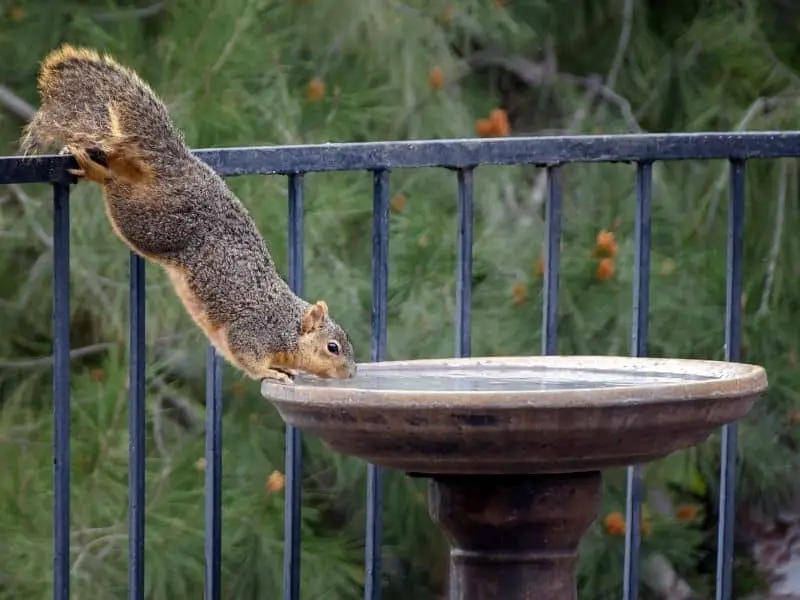
Water
According to experts, squirrels drink two to three tablespoons of water per day.
That may not seem a lot. But if you were as small as a squirrel, you would realize that that’s a lot of water!
The amount of water squirrels drink or require per day can vary. Squirrels need more water if…
- They’re pregnant
- They’re nursing baby squirrels
- The climate is hot
The best liquid that you can offer squirrels is clean and pure water.
Do squirrels drink water from a bowl?
Squirrels drink water from a bowl. If the bowl is too deep, rocks may be placed at the bottom and filled with water to the level of the rocks. This will prevent baby squirrels from drowning. Squirrels also drink water from a water fountain, birdbath and water dispenser attached to a squirrel feeder.
Just a quick tip: Leave a bowl of water under a tree or a piece of lawn furniture. This is to keep squirrels hidden from their flying predators, such as owls and hawks, while they are quenching their thirst.
Natural Fruit Juice
Contrary to popular belief, nuts are not the only things that squirrels eat.
They also eat other things, such as fruits. It doesn’t really come as a surprise because squirrels are predominantly vegetarians — but they eat meat, too.
Since squirrels eat fruits, naturally, they also drink fruit juice.
But be warned: Fruit juice that contains sugar, artificial flavorings, artificial colorings, artificial preservatives, and other ingredients that are bad for you is also bad for squirrels.
Never give squirrels fruit juice that you refuse to drink yourself because you know that it’s unhealthy. If it’s bad for you, then it’s certainly bad for squirrels and other innocent creatures, too.
If you want to give squirrels a much-deserved break from clean and pure water from time to time, go ahead and offer them fruit juice.
Just make sure that it’s the kind you make in your own kitchen. It’s perfectly fine to give squirrels store-bought fruit juice. However, before offering it to them, check that the product is 100% fruit juice.
Natural Vegetable Juice
Aside from nuts and fruits, squirrels also love a wide variety of vegetables.
They will eat anything from fleshy vegetables such as sweet potatoes, pumpkins, and zucchinis to leafy greens such as cabbage, kale, celery, and bok choy.
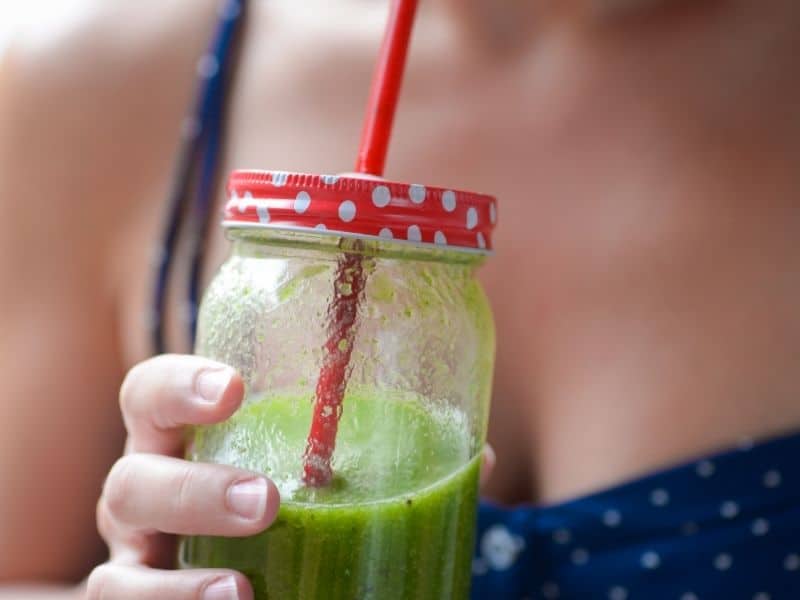
But just like fruit juice, the best vegetable juice for squirrels is the kind that’s 100% pure vegetable juice.
Needless to say, the best vegetable juice for these beady-eyed cuties is the kind that you make with your own two hands using a juicer.
Feel free to offer them vegetable juice from a store or juice bar, but check that it’s all-natural.
Just a quick tip: Give squirrels fresh vegetables instead of vegetable juice. It’s not that vegetable juice is bad for them, especially if it’s 100% pure. It’s just that fresh vegetables are better for them.
Tough and fibrous fresh vegetables are especially good for them, and it’s for a couple of reasons:
- They help keep the teeth of squirrels clean.
- They help wear down the teeth of squirrels as their pearly whites never stop growing!
Milk Replacer
It’s no secret that milk is one of the most nutritious drinks on the face of the planet. That’s because it is packed with high-quality protein and a bunch of vitamins and minerals.
According to experts, you should avoid giving squirrels cow’s milk.
It’s because their tiny digestive systems are not very good at digesting lactose present in cow’s milk.
It’s for the same reason why lactose-intolerant people stay away from cow’s milk — drinking it will leave them with an assortment of nasty digestive issues.
However, many participants on forums on the internet say that cow’s milk doesn’t seem to cause their pet squirrels any problems. It’s completely up to you to choose which side you would take.
But one thing’s for sure: You should never give baby squirrels cow’s milk because it will give them a bad case of diarrhea, which can easily lead to severe dehydration and death.
No other milk should be offered to baby squirrels but milk replacer that you can easily get your hands on at a veterinary clinic or pet food and supplies store.
Herbal Tea
Black tea, green tea, white tea, oolong tea and pu-erh tea — all of them are considered as true teas because they come from the camellia sinensis plant. These teas share another thing in common: they all have caffeine.
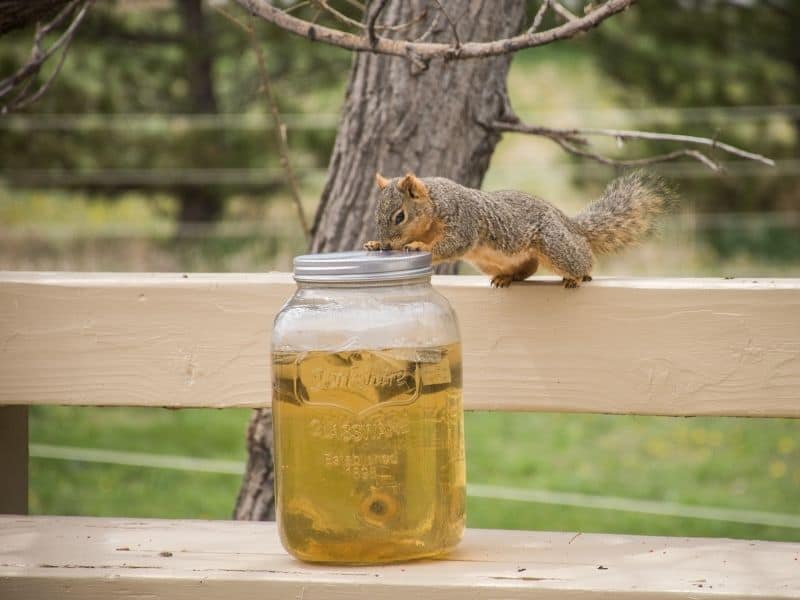
Although it’s true that true teas are healthy because they are rich in antioxidants, some people stay away from them as they have caffeine.
It’s because of their caffeine content why you should never give true tea to squirrels or any other animal. We will talk more about caffeine and why it’s bad for squirrels in a few. So don’t stop reading now.
There are true teas, and there are herbal teas, which won’t harm squirrels in moderation.
Also known as tisanes, herbal teas are caffeine-free because they do not come from the camellia sinensis plant, which has caffeine. Due to this, a little herbal tea won’t harm squirrels.
When it comes to giving squirrels herbal tea, there are a couple of things to remember:
- Allow herbal tea to cool to room temperature. The little lips and tongues of squirrels are not as tolerant to high temperatures as your lips and tongue.
- Refrain from giving them herbal teas that smell minty, such as peppermint tea and spearmint tea — squirrels don’t like their smell, which is why they work as all-natural squirrel repellents.
Liquids That Squirrels Cannot Drink
Just because you can drink it and find it delightful doesn’t necessarily mean that squirrels can drink it, too. While there are many liquids that squirrels can drink, there are also those that they cannot drink.
Well, they can drink those, but it’s for sure that it will lead to unfavorable effects in squirrels.
They can range anywhere from hyperactivity to cardiac arrest!
If you love squirrels and want to keep seeing them in all their adorable and mischievous glory, it’s a must that you avoid giving them liquids that are not suited for them to drink.
Without further ado, let’s take a look at some liquids that should be off-limits to squirrels:
Coffee
Earlier, it was mentioned that you should refrain from giving squirrels true teas such as black tea, green tea, white tea, oolong tea and pu-erh tea. That’s because all of them have caffeine.
The problem with caffeine is that it can cause the blood pressure of squirrels to increase.
It can also cause an irregular heartbeat (heart arrhythmia), which can easily lead to cardiac arrest — the little hearts of squirrels may just suddenly stop beating.
Too much caffeine can also cause loss of muscle control and seizures in squirrels.
In small amounts, caffeine may only cause squirrels to become agitated, hyperactive, and sleepless — pretty much the same effects caffeine has on humans.
True teas are bad for squirrels. Needless to say, coffee is bad for squirrels, too.
This is most especially true since coffee has double the amount of caffeine found in true teas.
So, if you don’t want to harm any squirrel on your property, refrain from leaving a cup of coffee with some coffee still left in it where squirrels may have easy access to it.
Is it safe for squirrels to drink decaf coffee?
Decaf coffee is just as bad for squirrels as caffeinated coffee. Caffeine is not the only substance in coffee that can harm squirrels but also theobromine. A compound found in coffee beans, theobromine is toxic to squirrels and other animals. In fact, too much theobromine is toxic to humans, too.
Theobromine can have the same effect on squirrels as caffeine, which means that it can kill them.
Perhaps you are aware of the fact that chocolates are bad for pets but do not know why. Well, the reason why chocolates are bad for pets is the same reason why coffee is bad for pets: theobromine.
True Tea
It’s true that black tea, green tea, white tea, oolong tea and pu-erh tea do not contain as much caffeine as coffee. Still, they have enough caffeine to cause problems in squirrels.
Besides caffeine, there is one more thing about true teas that make them bad for squirrels. And it’s none other than the various ingredients commonly added to them, such as milk and sugar.
Many store-bought bottled or boxed true teas have artificial flavorings and preservatives to make them more palatable and have a longer shelf life.
Artificial Fruit Juice
It was mentioned earlier that it’s perfectly fine to offer squirrels fruit juice.
However, it should be 100% pure fruit juice to make sure that you won’t be causing squirrels to ingest ingredients that they should not be ingesting.
Because of this, giving artificial fruit juice to squirrels is a complete no-no.
This is true even if the beverage contains actual fruit juice but is mixed with other ingredients, including especially artificial ones such as flavorings, colorings and preservatives that can easily wreak havoc on the overall health of squirrels.
If the label doesn’t say that it’s 100% pure fruit juice, do not allow squirrels to have it.
Many store-bought fruit juices are packed with sugar to make them more delightful to drink.
The problem with this is that a diet high in sugar can cause serious health problems such as obesity, diabetes, and heart disease in both squirrels and humans.
Squirrels may have a grand time drinking artificial fruit juices, but it can damage their health big time!
Soft Drinks
There are a couple of things about soft drinks that make them extremely bad for squirrels:
- Caffeine
- Sugar
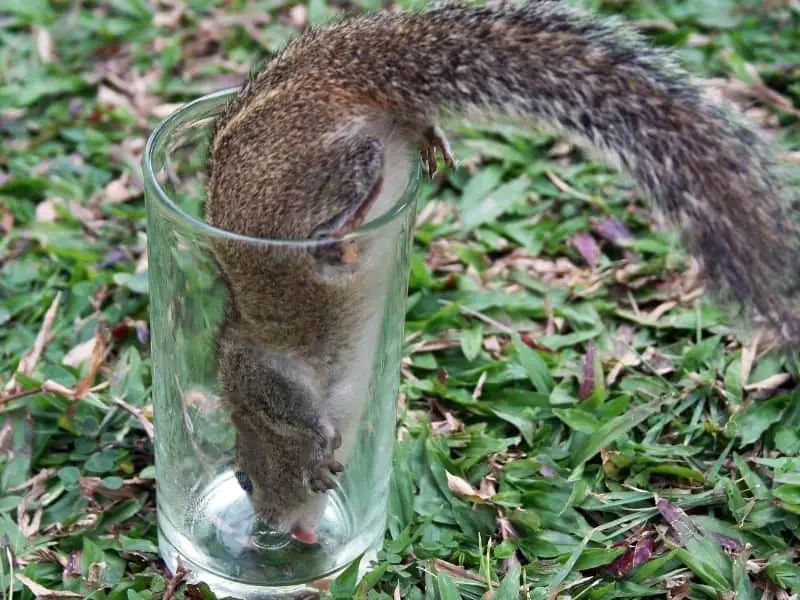
Both ingredients can have unfavorable effects on the behavior and health of squirrels.
Small amounts of soft drinks may not harm squirrels, as evidenced by the fact that none of the squirrels that drink soft drinks in trash cans die. Still, giving them soft drinks can put them at risk of ingesting enough caffeine and sugar to harm them.
Are diet soft drinks safe for squirrels to drink?
Even though diet soft drinks do not contain sugar, it’s just as bad for squirrels as regular soft drinks. That’s because it still contains caffeine. What’s more, diet soft drinks contain artificial sweeteners. There are many artificial sweeteners, and the majority of them are not good for animals.
In dogs, most artificial sweeteners can cause harm.
The most harmful of the bunch is xylitol. It’s so harmful that it can cause liver damage.
If this artificial sweetener can damage the liver of a dog, it can surely damage the liver of a squirrel, which is significantly smaller than the liver of a dog.
Sports Drinks
Electrolytes are what make sports drinks beneficial for athletes, bodybuilders and fitness enthusiasts.
Various electrolytes in sports drinks are sodium, chloride, calcium and potassium.
All of them are present in plants that squirrels can eat without any problem. So, in other words, electrolytes won’t harm these adorable rodents.
However, sports drinks also contain a lot of sugar, making them bad for squirrels.
Artificial flavorings and artificial colorings — these ingredients are what make sports drinks taste refreshing and look cool, respectively. Since they do not naturally exist in nature, it’s a terrible idea for squirrels to consume them.
These days, organic sports drinks are available in the market, which are said to be healthier. So, are they more suitable for squirrels to drink than regular sports drinks? Not quite!
What makes these beverages worthy of having the word “organic” stamped on their packaging is the fact that they contain organic sugar instead of the usual refined sugar.
Unfortunately, according to health experts, organic sugar still has the same effect on blood sugar levels. Needless to say, they are bad for you and squirrels, too.
Energy Drinks
Refrain from thinking that energy drinks and sports drinks are one and the same. There is one very important thing that sets these two types of beverages apart. And it’s none other than caffeine.
The goal of sports drinks is to keep your body hydrated by replacing lost fluids and electrolytes. In the process, it can help you perform better physically.
Also, the sugar content of sports drinks helps fuel the muscles. On the other hand, the goal of energy drinks, just like what their name suggests, is to energize you.
It’s for this reason why caffeine is present in these beverages — caffeine is a nervous system stimulant.
Besides caffeine, energy drinks have other ingredients, too. Some of the most common ones are:
- Ginseng
- Guarana
- Taurine
- B vitamins
Taurine can be found in some pet foods. B vitamins can be found in multivitamins for pets.
While both taurine and B vitamins may not harm squirrels, the same cannot be said for ginseng and guarana. That’s because both of them can have unfavorable effects on the teeny hearts of squirrels.
Alcohol
It’s possible for fruits to ferment on their own. All it takes is for yeast to be present to break down the sugars in fruits into ethanol, which is a type of alcohol.
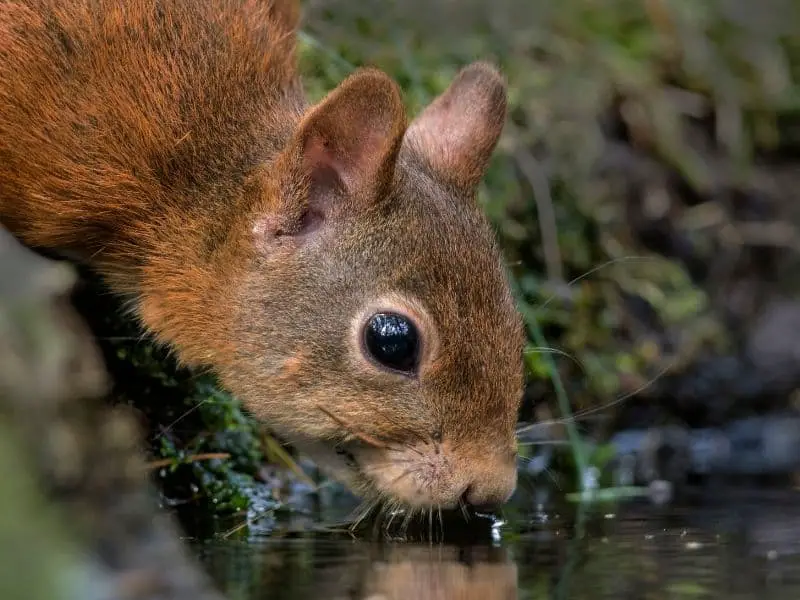
Squirrels that eat fermented fruits, which contain ethanol, get drunk. And when they get drunk, they can be funny, such as the fermented pear-eating squirrel in a viral video.
Squirrels can ingest alcohol from nature. However, it doesn’t mean that it’s perfectly fine to give them alcohol.
Fruits are the raw materials for making alcoholic drinks. However, they do not produce as much alcohol when they ferment in nature as when they ferment in distilleries.
Besides, before squirrels end up having toxic amounts of alcohol from fermented fruits, they would be drunk enough to stop munching on them.
Alcoholic drinks, including red wine that is proven to have an assortment of health benefits if taken in moderation, should never be given to squirrels to drink.
Just Before You Offer Squirrels a Drink
Squirrels will eat most human foods. Similarly, they will drink most liquids that humans drink.
However, it doesn’t mean that just about any drink you have in your hand should be given to squirrels. Many of your favorite drinks are bad for squirrels, from coffee, true tea, artificial fruit juice, soft drinks, sports drinks, energy drinks to alcohol.
If the sight of squirrels on your property leaves you feeling happy, give them water to drink. Natural fruit and vegetable juices, milk replacers and herbal teas may be okay for squirrels, but clean and pure water is the best for them.
Medical Disclaimer: TheHomePestControl is a digital publisher and does not offer personal health or medical advice. The contents of this website are not intended to substitute for professional medical advice, diagnosis, or treatment.
Affiliate Disclaimer: As an Amazon Associate, I earn from qualifying purchases made on our website. If you make a purchase through links from this website, I may earn a commission at no additional cost to you.
